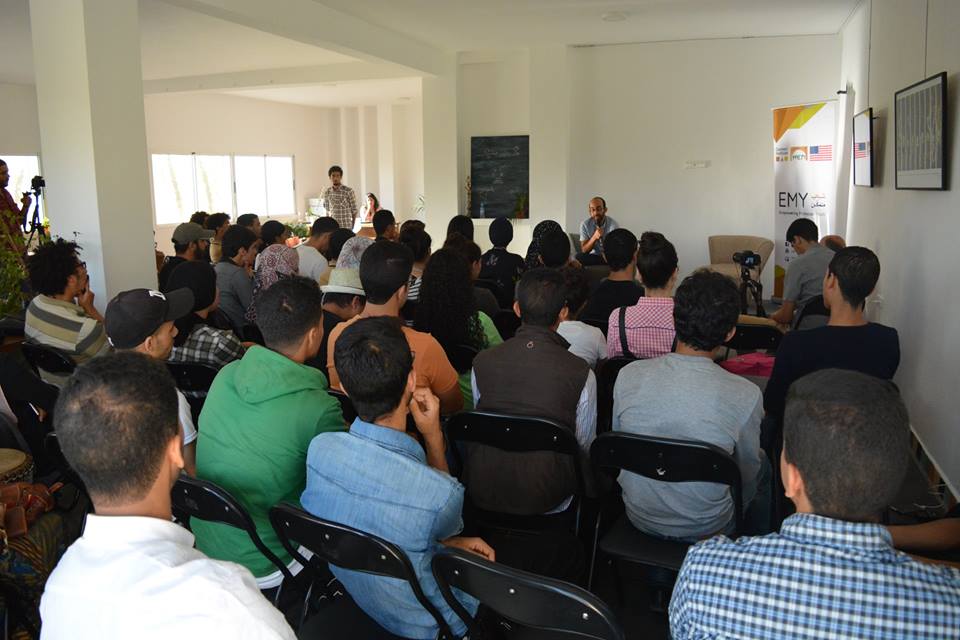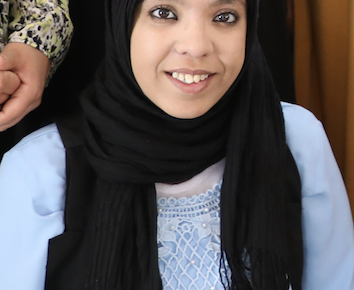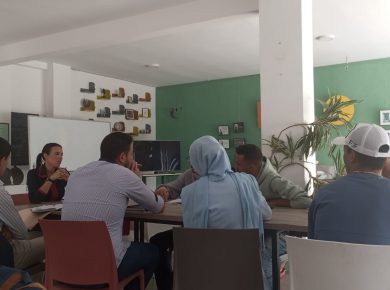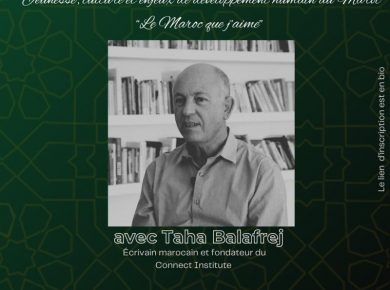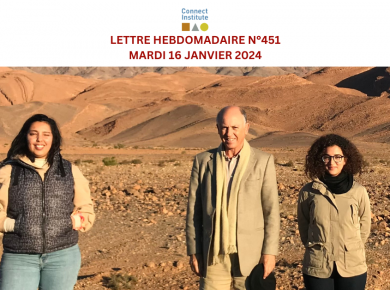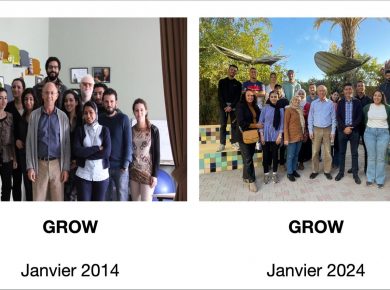Nos jeunes du programme MOMKIN 20 continuent le travail d’investigation avec les étudiants américains de SIT Study Abroad. Treize jeunes marocains et douze jeunes américains voyagent ensemble dans plusieurs villes du Maroc pour mener des recherches et faire des interviews afin d’écrire des articles sur un sujet de leur choix.
Voici le texte de Imane sur son expérience :
“We first met on Friday, near hotel Clichy at 8 am. I had to leave my campus residence at 7; it was as dark as Joan Cornella’s humor.
I was scared. There was a guy on a motorcycle, and we were the only ones there in the middle of nowhere. I just ran towards the bus station as fast as I could, got in, took a taxi and then walked to the location in which we were supposed to meet.
Marouane was late because he missed his bus. Mimi and I sat at a café and started discussing the cultural differences between Morocco and America. I was freezing and Mimi was barely wearing anything. She complimented my scarf and I complimented her strong tolerance for such a cold weather. Marouane was there at 9, he was feeling uneasy because he was late, so he went for a smoke.
We decided to head to El batoir and take a taxi to Tikiouine, then a “transit” to get to Tinghanimine. I’ve never been on such a means of transport. It wasn’t that bad, I thought it was cozy. I was near the window so I kept looking at the mountains for a while. And then started looking down because I was feeling dizzy. We got to our location. There was no signal, I noticed because the notifications stopped. We asked for directions and then went towards the cooperative.
I loved the smell of the countryside. Even animal droppings smelled good. We talked to one of the working women, she said that they were on a vacation, and none of the women was available for filming. She also said we had to contact the head of the cooperative for permission to film. We’ve already tried to contact her days ago but to no avail. I decided to text her. I’ve put a lot of effort into that text. It was disappointing to find that she was not free to respond to that either.
On our way back to the main road, we met a very interesting man. He had two adorable dogs, one of which I had fun patting while he was talking to Marouane. His ancestors were from the area, so he settled there since five years ago. He regretted spending most of his life in the city. He owned an ecological restaurant. I asked for his contact information in order to interview him at a later time. He seemed like he had a story to tell.
We took another transit towards Tikiouine so as to have lunch. We had a chicken tagine. There was a creepy dude that kept walking by Mimi recurrently. Marouane was busy making phone calls and using his contacts to find more cooperatives, at that he succeeded, but Mimi and I were feeling uneasy. Especially me, because I felt responsible and I didn’t want anyone hurt. I knew for a fact that Tikiouine was not safe, and there were very little to no tourists there for that reason. Luckily, we’ve already finished eating, so I decided we pay and take a taxi back to El batoir.
From there, we sat at a café in Uniprix, continued with our work and had some very interesting discussions. Mimi talked about her life in America, she did track and was in great shape. She showed me videos of their college field, it was huge. I started thinking about how I would’ve ended up if I were born there. Probably some stuck up brat. I’m glad I was born in Morocco.
Mimi left to go apply for a gym. I sat and worked with Marouane until I felt like going home.
On Monday, we decided to meet at 9. This time Marouane was early, and Mimi was late. Once she arrived, my father gave us a ride to the station. We headed to Aourir, I bought toothpaste and a toothbrush because I felt like I was not staying the night at home.
Afterwards, we took a transit towards Imozar. We arrived at the hospital in which Aicha; one of Marouane’s contacts who used to work at a cooperative that shut down, worked. She was very friendly but spoke no word of Arabic. I suddenly felt left out and understood Mimi’s frustration.
She introduced us to Mohammed who owned a café, he was nice enough to give us a ride towards the hostel in which he lived so as to interview the manager of their cooperative. Mimi got her equipment ready, and I started preparing the questionnaire with Marouane. Mimi chose the place that had more depth for better image quality. I added that to my photography techniques.
The man we were interviewing seemed educated and was able to comprehend when I was explaining to Marouane that the interviewee should be answering in full sentences in a way that we could tell what the question was. Mimi stressed the importance of that. He talked in Amazigh, but I was able to follow. I learned a few things. Notably, how handmade Argan serves as food because it smells and tastes better. However, it expires faster than the one made by machines.
After we’ve had breakfast with the owners of the hostel, we decided to film the president of the cooperative; Fatema. I helped Marouane choose the questions, and Mimi continued filming.
We rested, had lunch, and then headed to the cooperative in order to film there. The smell of paint irritated my eyes. There was a lot of background noise of kids and Fatema that kept interrupting the woman who was being interviewed, that enraged me. I just wished for it to end. I couldn’t tell a woman three times my age to be quiet.
We were done for the day and had nothing else to do, we decided to hitchhike and got on a pick-up, it was awesome. It was going really fast, it felt like I was on a rollercoaster. We could see the sunset and its reflection on the mountains. It was one of the most beautiful things I’ve ever lived to witness.
No Instagram filter could have subdued what I saw.
We stayed at Mohammed’s café until he was done with work, and gave us a ride back. The owners of the hostel accompanied us. A little kid came asking for my help with their French exercise. I hope she can now differentiate between past, present and future tense.
One of the men there suddenly said that Mimi could spend a month in the hostel and she would learn Amazigh, and I who spent my entire life in Agadir haven’t learned a single word.
Ironically enough, he spoke in Amazigh and I understood every word. I ended up translating to Mimi.
The moon was full and beautiful and its light was strong to the point that it served as lighting.
We set the alarm for 6:30 am. Mimi had a nightmare and woke up at 3 because she thought a spider was crawling on her leg. She’s the one who didn’t want to stay in a hotel so as to save money. I felt bad because before going to bed, Marouane and I teasingly told her to check her pillow for scorpions, and that must’ve triggered the nightmare.
We waited for Mohammed to wake up and drive us to his café. And so he did.
We were exhausted. Marouane started watching the videos we’ve filmed. I just wanted to go home. I felt like all of it was labor, we had no recreation time.
Kamal kept sending me pictures of him having a blast with his team, and that bummed me out.
We went back, did some editing at another café and went our separate ways.”



